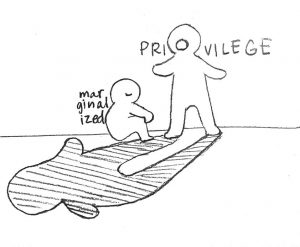Universities must protect diversity for better learning
Colleges across the country, including Northwestern University and the University of Iowa, have responded to President Donald Trump’s racially divisive rhetoric and policy. These institutions have rolled out new initiatives, committees and research grants with the sole purpose of promoting diversity and inclusiveness. Beyond the importance of solidarity and advocating for groups that have been unfairly attacked by the policies and rhetoric of this new administration, such efforts amount to deeply important educational and real-world benefits as well. USC must ensure that despite today’s divisive political climate, students of all backgrounds and identities feel secure enough to equally contribute to their learning environments.
People of marginalized identities face more and more hostility and pushback under this presidential administration, which has already made clear its intent to crack down on deportations and bar the entrance of Muslims fleeing persecution. Thus, the myriad of benefits to diversity, in all spheres of society but in education most of all, must be emphasized now more than ever. The University must make protecting diversity, a critical staple of any successful environment of higher learning, a priority.
USC recently hired Shaun R. Harper, an expert at promoting diversity, to join its faculty as a professor as well as the founder of the USC Race and Equity Center. The University is on its way to improving the experiences of students of color as well as other marginalized minority groups, but given today’s divisive political climate — which has left many members of the student body feeling vulnerable and unsafe — more steps must still be taken to bridge the gap between these resources and the students who need them.
More than 24 percent of USC’s student body is composed of international students, and 42 percent of its student body comes from ethnic minority groups. USC prides itself on its ethnic and cultural diversity.
According to a recent report by the Wall Street Journal, USC ranks second out of the top 25 national universities in terms of diversity, analyzing data from both students and faculty. As a large, selective university with one of the most racially diverse student bodies in the country, USC has a clear responsibility to cultivate an atmosphere on campus that encourages cross-cultural interactions, which would be to the benefit of all members of the student body. Study after study has corroborated that diversity is a cornerstone of higher learning and preparing oneself for the professional world.
According to data from the 2015 United States Census, Asian Americans and non-Hispanic white Americans are more likely to hold bachelor’s degrees or higher than African Americans and Hispanics. The widespread circulation of data such as this contributes to the formation of negative stereotypes toward minority groups. In establishing campus climates that support all students of color in their educational pursuits, USC would effectively contribute to dismantling these harmful societal stereotypes. After all, diversity does not stop at mere numbers.
By promoting a mindset that looks beyond racial misconceptions, USC would be able to help bridge these gaps and limit the extent to which racial background contributes to educational achievement. Hosting diversity and inclusion rallies and establishing an office to ensure marginalized identities are protected by allowing students to report their experiences and seek counseling are crucial steps to making sure students of all backgrounds are able to contribute to USC’s academic environment to the benefit of all students. Developing atmospheres of inclusion has been shown to stimulate innovation across all fields, as students become more aware of different cultures beyond their common stereotypes.
Demographics released by the U.S. Census state that by 2050, there will be no clear racial minority. Keeping these statistics in mind, failing to develop a campus climate that embraces diversity could be considered a failure to prepare the future workforce of the United States.


Exactly who is or what group is threatened, persecuted or excluded at USC? It all sounds like a false narrative, but ever so hip.
College is such a coddled, insulated environment. No amount of JEP or “cultural immersion” is going to change that.